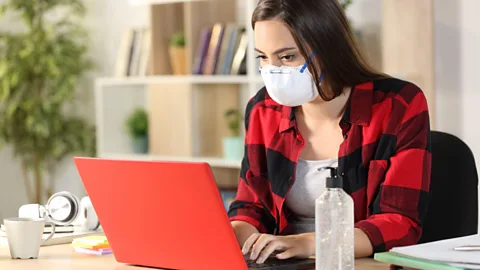How to write emails in a pandemic

Ending an email with ‘All the best’ or ‘Regards’ seems too detached right now. What can we say that seems genuine and compassionate?
Few things have been left unaffected by Covid-19 – even email. As San Francisco-based podcast host Olivia Allen-Price wrote on Twitter: “2020: The year my e-mail sign-off went from ‘Cheers’ to ‘Hang in there’”.
Salutations once considered polite – ‘All the best’ or ‘Regards’ – can now come off as overly detached. Other more cheerful sign-offs – ‘Hope you’re having a great week!’ – seem tone-deaf. Email communication has become a balancing act: to ignore the pandemic seems disingenuous, but to overdo the platitudes about health and safety might peddle more panic.
But we still need to communicate in our daily lives for both work and personal matters – perhaps now more than ever. What, exactly, can we say that seems genuine, compassionate and doesn’t induce a feeling of doom?
Experts say it’s not only possible to write emails in a way that’s sympathetic, but the right words can even breed a sense of global camaraderie. Ken Tann, a lecturer in communications management at the University of Queensland, says that certain sensitive phrases can go far. “By using these phrases,” he says, “we’re commiserating over the impact we feel from the pandemic and reminding one another that we’re not alone.”
Striking the right chord
Changing a few words at the beginning or end of our emails may appear like an insincere or tokenistic gesture – and one that’s insufficient in the face of a global pandemic. But the opposite is actually true, says Tann: the language we use is now even more critical to signal a sympathetic tone and to establish a rapport. And it’s important that we get it right, since misunderstandings can no longer be patched up in person.
“By adjusting our greetings and sign-offs, we effectively adjust our social relationships,” says Tann. The way we start and end emails are critical signposts that demonstrate the relationship between sender and recipient. They become, as Tann puts it, “a way to establish how we want to relate to the person we’re writing to, in terms of formality, status and familiarity”.
For Arden Clise, a Seattle-based etiquette consultant, and author of Spinach in Your Boss’s Teeth: Essential Etiquette for Professional Success, our communications must also acknowledge that we are living in extraordinary times. “If you’re not acknowledging the challenges of our world right now, it looks like all you care about is business,” says Clise. “You come across as focused on only the bottom line.”
‘Recognition sandwich’
Justine Rogers, a senior lecturer in ethics and law at the UNSW Sydney, changed both her introductions and signatures once Covid-19 hit Australia. Her emails have become, as she puts it, “a CV19 recognition sandwich”.
Both slices of ‘bread’ are important for how your communications will be read and interpreted.
For Mike Reid, founder and CEO of Basecamp Strategy, a Washington, DC-based political fundraising company, the very first sentence matters most. (In fact, he hasn’t changed his sign-off in any of his business communications.) “In the first sentence of an email you have to acknowledge: ‘I hope things are okay, I hope you are well, considering’,” he says. “I think that can actually lead to a more meaningful interaction.”
 Alamy
AlamySnezana Pejic, founder of The Etiquette Academy of New England in Massachusetts, says that today, communications need to be more compassionate. “People are fatigued from isolation and fear: fear about the economy, fear about their families and their future.” She believes we have to use language with caution so as not to add to mounting stress. Previously, she signed off emails with “Warm Regards”. Now, unless the message is urgent, she writes, “I look forward to your reply at your leisure”.
But be wary of how you express that compassion. “It feels rude to blindly say: ‘Stay safe’,” says Reid. “I don’t know if they might already have coronavirus or if a family member does.”
Rogers also avoids any mention of staying safe. “A lawyer I’m doing research with said something like ‘I hope you and your family are all safe.’ A few of my colleagues similarly signed off with ‘stay safe’,” she says. “I found the mention of ‘safe’ rather anxiety-inducing, especially the mention of ‘family’ from people who would have had to guess I even have one.”
Can humour heal?
As many people struggle with how to communicate amid the coronavirus pandemic, some are suggesting lightening the mood. American job-seeking website FlexJobs posted 13 socially distanced email sign-offs. Some strike a more serious tone, but other suggestions are meant to elicit a few laughs, or at least keep things buoyant: ‘Have a great socially distant day’, ‘Yours from afar’, ‘Sent from my living room’ and ‘Cautious cheers’.
 Alamy
AlamyAlthough picking a more unusual sign-off, or tailoring your own, can work wonders if done sensitively, experts say that for the most part your email signature is no place to make light of the global crisis.
For instance, ‘Stay sane’ might appear jovial and light-hearted to the sender; if the recipient is feeling down or depressed, however, it could become triggering. Writing ’Handwashingly’ might elicit a laugh from those in good health, but it could hit all the wrong notes for someone who is sick, grieving or recently unemployed.
“It is incredibly important to realise that the person on the other end with whom you are dealing may be in a very serious situation: you don’t know what they are facing,” says Candace Smith, founder of Candace Smith Etiquette in Orange County, California. “Stay away from humour unless you know someone very well. [You] don’t know how things will land.”
If you’re close to the situation of the person you’re emailing, however, humour can provide a helping hand during dark times. “A little light heartedness [can] make someone smile,” says Smith. She adds that tenderness with those you care about can also be okay. “Sometimes, it feels right to say ‘Hugs’.”
Is there anything left to say?
If it appears like there are one too many rules to follow, try out something like, ‘Sending thoughts of health and peace’, ‘Take care’ or ‘Sincerely in these strange times’. It can help you communicate a human element without worrying about burning bridges or embarrassing yourself.
No matter what language you use, take the other person into consideration, says William Hanson, a British etiquette coach and executive director of etiquette institute The English Manner. He advises ditching generic email conventions altogether for something more personal. “Tailor it to the recipient,” he says. “Not many of us are seeing anywhere near the number of people we are used to seeing at the moment. This is why adding a more personal touch to your emails, rather than using generic sign-offs, is important.”
Even so, it may still seem like there’s nothing right to say. It can help to remember, though, that everyone is struggling with talking to each other at least a bit – and simply using a combination of compassion and instinct can likely get you over the line.
